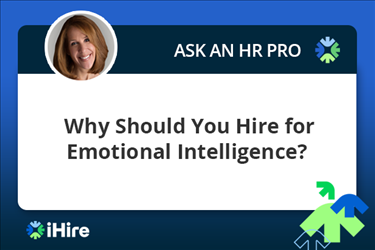- Employer Resources
- |
- Last Updated: April 12, 2024

Remote Hiring in Healthcare: 5 Tips for Conducting Remote Healthcare Interviews
In the ever-evolving healthcare industry, where patient care and efficiency are paramount, remote interviewing has emerged as a powerful tool to streamline the hiring process while accessing top candidates from around the globe. In this article, we will explore the benefits of remote interviewing in healthcare, provide tips for conducting successful virtual healthcare job interviews, and discuss how remote healthcare interviews can extend to virtual onboarding. We will delve into the unique challenges and opportunities presented by remote interviewing in the healthcare field, offering insights and strategies to make the most of this innovative approach.
Benefits of Remote Healthcare Interviews
Remote healthcare interviews offer several advantages over traditional in-person interviews. These benefits include:
- Access to a Larger Talent Pool: Remote healthcare interviews allow organizations to reach candidates from across the globe, expanding the pool of qualified applicants. This broader reach increases the likelihood of finding the best candidates for the job, regardless of their location.
- Reduced Costs: Virtual healthcare job interviews eliminate the need for travel and accommodation expenses, making them more cost-effective than in-person interviews. These cost savings can be significant, especially for healthcare organizations that are hiring for multiple positions or interviewing many candidates.
- Efficient Use of Time: Remote healthcare interviews allow hiring managers to conduct interviews more efficiently. Because there is no need to travel or even leave their office, hiring managers can schedule back-to-back interviews without wasting time on logistics. This efficiency can help healthcare organizations fill positions more quickly.
- Facilitation of Peer Interviews: Remote healthcare interviews make it easier for hiring managers to involve other team members in the interview process. Peer interviews can provide valuable insights into a candidate's skills, abilities, and fit for the organization. By conducting peer interviews virtually, healthcare organizations can save time and money without sacrificing the quality of the interview process or employee productivity.
- Accommodation of Different Time Zones: Virtual healthcare job interviews allow organizations to interview candidates across different time zones. By using asynchronous interview tools, healthcare organizations can collect video responses from candidates at their convenience, eliminating the need for scheduling conflicts. Read below for more information on asynchronous interview tools.
These advantages demonstrate how remote healthcare interviews can streamline the hiring process, reduce costs, and improve the quality of healthcare hiring. By embracing remote interviewing, healthcare organizations can gain a competitive edge in attracting and retaining top talent.
5 Tips for Conducting Remote Healthcare Interviews
With the increasing adoption of telemedicine and the need for flexibility in a post-pandemic world, healthcare organizations are embracing remote interviewing to reach a wider talent pool and enhance their recruitment strategies. However, this interview technique requires some unique strategies compared to traditional, in-person interviews. Here are five tips for conducting successful remote healthcare interviews:
- Communicate plans for remote healthcare interviews with candidates.
- Consider alternative methods for virtual healthcare job interviews.
- Use asynchronous interview tools.
- Collect feedback after virtual healthcare job interviews.
- Fine-tune your remote healthcare interview process.
Communicate Plans for Remote Healthcare Interviews to Candidates
When scheduling a remote healthcare interview, ensuring candidates are well-prepared and aware of the virtual nature of the interview is crucial for a positive interview experience. Here are a few tips for effectively communicating your plans to candidates:
- Specify the Remote Format: Clearly state in the interview invitation that the interview will be conducted remotely via a video conferencing platform. Provide specific details, such as the platform (e.g., Zoom, Google Meet) and any technical requirements (e.g., downloading the app, testing audio/video) to help candidates prepare.
- Send Pre-Interview Instructions: Provide candidates with a comprehensive set of instructions before the interview. This can include guidelines for setting up their environment (e.g., finding a quiet place, ensuring a stable internet connection, using a professional background), dress code expectations (e.g., business casual), and troubleshooting tips in case of technical difficulties.
- Offer a Tech Check: Schedule a brief tech check a few minutes or a day before the interview to ensure candidates can connect efficiently. This allows candidates to test their equipment, resolve any issues, and familiarize themselves with the platform.
- Provide Contact Information: Include a point of contact (e.g., phone number, email address) in the interview invitation in case candidates encounter technical problems during the interview. Having this support available will reduce stress and ensure a smooth interview experience.
By communicating your plans for remote healthcare interviews transparently and proactively, you can set candidates up for success and create a positive impression of your organization.
Consider Alternatives for Virtual Healthcare Job Interviews
While virtual healthcare interviews offer numerous advantages, some candidates may not be proficient with particular technology tools. There is also always the risk that the technology doesn’t work as intended at a given time. To ensure an inclusive and accessible hiring process, consider back-up methods for conducting virtual healthcare job interviews:
- Phone Interviews: If a candidate lacks access to a stable internet connection or prefers a more traditional approach, consider conducting a phone interview. Phone interviews can provide a personal connection and allow candidates to focus on their responses without worrying about technical glitches.
- Email Interviews: For candidates who have limited availability or when all the technology fails, email interviews can be a suitable backup option. Email interviews involve sending a list of predetermined questions to the candidate, who then responds in writing. This method provides flexibility and allows candidates to take their time in crafting thoughtful responses.
- Written Assessments: Written assessments can be used to evaluate a candidate's knowledge, skills, and abilities. These assessments can be designed to be completed online or offline and can provide valuable insights into a candidate's technical capabilities and problem-solving abilities.
When considering alternative methods for virtual healthcare job interviews, it’s important to consider if technology use will be an essential part of the position, such as with telehealth. No matter what format you decide to use, communicate clearly with candidates and provide any instructions they may need. By offering alternatives, you can ensure that all candidates have an equal opportunity to showcase their qualifications and make a positive impression during the interview process.

Use Asynchronous Interview Tools
In today's fast-paced healthcare industry, where professionals often have demanding schedules and time zones can be a barrier, asynchronous interview tools offer a flexible and convenient solution for remote healthcare interviews. These tools allow candidates to record their video responses to interview questions at their own convenience, eliminating the need for real-time coordination.
There are many benefits of asynchronous interview tools in healthcare hiring. Notably, they increase accessibility. When looking for top talent, it is very likely they are dedicated to their patients and have a very busy schedule. Another major benefit is the flexibility to accommodate various time zones. The best person for your healthcare position might live in California while your organization is in New York. Rather than trying to juggle schedules, asynchronous interviews can allow the candidate and hiring manager to complete interview tasks at their convenience. Finally, asynchronous interviews provide candidates with the opportunity to reflect on their answers and deliver well-thought-out responses. This format reduces the pressure of on-the-spot answers and allows candidates to showcase their skills and experiences more effectively.
Asynchronous interview tools are a relatively new method of interviewing, and certainly new to the healthcare hiring space. Therefore, it’s important to consider the following best practices when utilizing these tools:
- Provide Clear Instructions: Provide candidates with clear instructions on how to use the asynchronous interview tool, including any technical requirements or guidelines for recording their responses.
- Ask Open-Ended Questions: Design interview questions that are specific, open-ended, and encourage candidates to showcase their expertise and experiences. Avoid questions that require simple yes/no answers.
- Include Time Limits: Set reasonable time limits for candidates to record their responses. This ensures that candidates know what the expectations are and that the interview process remains efficient.
- Ask Follow-Up Questions: Carefully review and evaluate each candidate's video responses. Assess their responses based on the job requirements, skills, and experiences outlined in the job description. Then, don’t be afraid to ask follow-up questions via email or using the asynchronous interview tool. Unlike synchronous interviews, asynchronous interviews don’t naturally allow for back-and-forth conversation, but this is still an important part of finding the right candidate.
Asynchronous interview tools are a valuable asset for conducting remote healthcare interviews. By embracing this flexible and convenient approach, healthcare organizations can accommodate busy schedules, overcome time zone differences, and enhance the overall candidate experience.
Collect Feedback after Virtual Healthcare Job Interviews
Gathering feedback after conducting virtual healthcare job interviews is crucial for continuous improvement and enhancing the candidate experience. Here's how to collect it effectively:
- Post-Interview Surveys: Send out post-interview surveys to candidates to gather their immediate feedback. Include questions about their overall experience, the interview format, the clarity of instructions, and any technical issues encountered.
- Interviewer Self-Assessment: Encourage interviewers to conduct self-assessments after each interview. Ask them to reflect on their performance, identify areas for improvement, and provide suggestions for enhancing the process.
- Virtual Debrief Sessions: Host virtual debrief sessions with the interview panel to discuss the interviews. Share insights, evaluate candidate responses, and identify common themes or patterns.
- Follow-Up Conversations: Reach out to candidates who were not selected for the position to gather their feedback. This demonstrates your commitment to continuous improvement and shows respect for their time and effort.
By actively collecting and analyzing feedback after virtual healthcare job interviews, you can optimize your remote hiring process, enhance the candidate experience, and attract top talent to your organization.
Create Your Account Today to Reach Top Healthcare Talent
Fine-Tune Your Remote Healthcare Interview Process
Once you have gathered feedback, it’s important to use it for improving the virtual healthcare job interview process. Here are some ways the feedback can drive change:
- Identify Areas for Improvement: Feedback helps you identify strengths and weaknesses in your remote interviewing process. This enables you to make necessary adjustments to improve the overall quality and efficiency of future interviews.
- Assess Interviewer Performance: Use feedback to assess the performance of your virtual healthcare job interviewers. Look for areas where they can enhance their questioning techniques, communication skills, and ability to create a positive candidate experience.
- Understand Candidate Perspectives: Feedback from candidates provides insights into their experiences during the remote healthcare interview process. This can help you understand their perceptions of your organization and identify ways to improve the overall candidate journey.
Collecting feedback allows you to make data-driven decisions about your remote healthcare interviewing process. Use the feedback you collect to inform changes in technology, interview formats, and communication strategies for the best possible remote healthcare interviews.
4 Tips for Virtual Onboarding in Healthcare
Once you have hired a candidate, you can also use virtual tools for onboarding. If candidates are having to move, plan to conduct their sessions through telehealth, or are still working their old position until their start date, virtual onboarding can be one way to attract top talent.
To ensure a successful virtual onboarding experience for new healthcare hires, it's crucial to have a well-structured and comprehensive onboarding plan in place. Here are four tips and considerations to keep in mind:
- Pre-Onboarding Preparation: Start the onboarding process even before the new hire's first day. Send them a welcome packet that includes essential information such as the organization's policies, procedures, and IT requirements. This will help them familiarize themselves with the company and prepare for their onboarding activities.
- Virtual Orientation: Conduct a virtual orientation session to introduce the new hire to the organization, its culture, and their team. Use video conferencing technology to create a more personal and interactive experience. During this session, cover topics like company values, goals, and expectations, as well as provide an overview of the new hire's role and responsibilities.
- Assign a Virtual Mentor: Pair each new hire with a virtual mentor who can provide guidance and support throughout the onboarding process. The mentor should be an experienced professional familiar with the organization and the new hire's role. They can help answer questions, offer advice, and ensure the new hire feels supported and integrated into the team.
- Utilize Technology and Online Resources: Leverage technology and online resources to facilitate virtual onboarding. Provide access to online training modules, tutorials, and resources that the new hire can use to learn about the organization, their role, and the healthcare industry. Use video conferencing tools to conduct virtual meetings and team discussions, enabling the new hire to connect with their colleagues and build relationships.
By following these best practices and considerations, healthcare organizations can create a structured and effective virtual onboarding process that ensures a smooth transition for new hires, fosters a sense of belonging, and sets them up for success in their roles.
Find Top Talent With Virtual Healthcare Job Interviews
In recent years, remote healthcare interviews and virtual onboarding have emerged as effective strategies for attracting and integrating top talent in the healthcare industry. By utilizing asynchronous interview tools, collecting feedback, and refining the interview process, healthcare organizations can create a seamless and positive candidate experience. Additionally, implementing a well-structured virtual onboarding plan ensures that new hires are effectively integrated into the organization, fostering their success and engagement from the very beginning. Embracing these remote healthcare interview strategies enables you to overcome geographical barriers, accommodate busy schedules, and create a more inclusive and efficient hiring process.
Looking for more healthcare hiring tips? Check out the iHire Resource Center.




